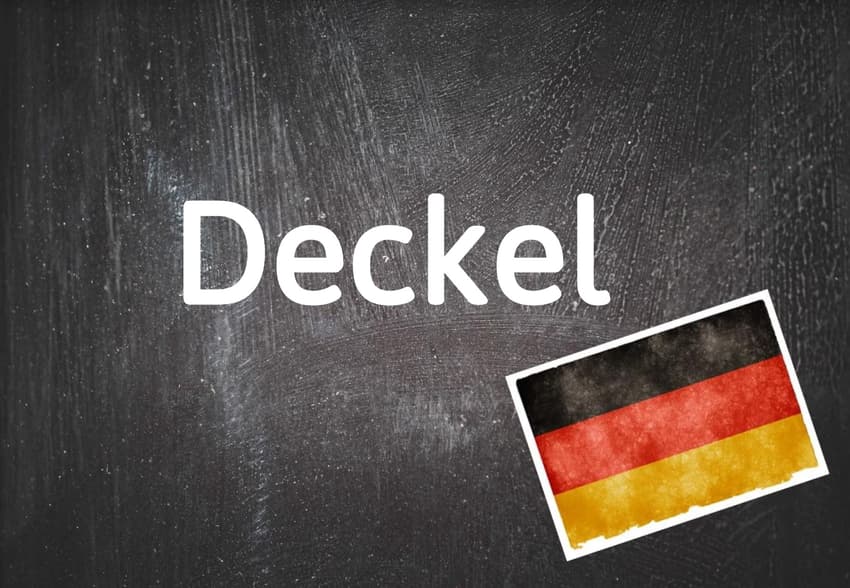German word of the day: Deckel

You’re likely to see this word in German newspapers a lot when people are struggling financially or facing a challenging time economically. This word, alongside a few others, will help you understand what’s going on.
What does it mean?
It started out—and still sounds—innocent enough. Starting out from Low German’s written form Dekkel in the 1800’s, today’s Deckel (der or masculine) has a few benign uses.
It can simply mean ‘cover.’ A Deckel can be a pot or bottle lid. Its verb—bedecken—can mean to cover or to hide. A Bedeckung might refer to a covering, such as Mund und Nasenbedeckung, or ‘a covering for your nose and mouth’ that we often heard during the pandemic.
But it’s increasingly used in serious economic discussions, often when someone suggests a cap on prices or costs.
How do you use it?
In general, you can refer to a Kostendeckel, or something more specific.
To use it, just add it on as a suffix to what needs capping.
Just this week, German housing boss Axel Gedaschko called for the Scholz government to put in a Gaspreisdeckel—or a cap on the price of gas—to help tenants struggling to heat their homes and pay their utility bills amidst rising costs.
Berlin Mayor Franziska Giffey says she’s in favour of a Energiepreisdeckel, or a cap on energy prices as a whole, rather than just a cap on the price of gas.
Berliners especially might already be familiar with the word, from the time the city introduced a rent cap—or a Mietendeckel—before the Federal Constitutional Court struck it down.
What other words might I see with it?
Also in the papers recently, you might run into a similar word—Bremse—meaning ‘brake.’ Often implying a softer upper limit rather than a hard cap, like Deckel does, the federal government has said it’s working on a Strompreisebremse—or a brake on energy prices.
Finally, in the opposite spirit of Bremse and Deckel is Umlage—or ‘levy.’ The clearest recent example of this is the planned Gasumlage, or ‘gas levy,’ which will pass on higher gas costs to consumers in Germany starting in October.
Comments
See Also
What does it mean?
It started out—and still sounds—innocent enough. Starting out from Low German’s written form Dekkel in the 1800’s, today’s Deckel (der or masculine) has a few benign uses.
It can simply mean ‘cover.’ A Deckel can be a pot or bottle lid. Its verb—bedecken—can mean to cover or to hide. A Bedeckung might refer to a covering, such as Mund und Nasenbedeckung, or ‘a covering for your nose and mouth’ that we often heard during the pandemic.
But it’s increasingly used in serious economic discussions, often when someone suggests a cap on prices or costs.
How do you use it?
In general, you can refer to a Kostendeckel, or something more specific.
To use it, just add it on as a suffix to what needs capping.
Just this week, German housing boss Axel Gedaschko called for the Scholz government to put in a Gaspreisdeckel—or a cap on the price of gas—to help tenants struggling to heat their homes and pay their utility bills amidst rising costs.
Berlin Mayor Franziska Giffey says she’s in favour of a Energiepreisdeckel, or a cap on energy prices as a whole, rather than just a cap on the price of gas.
Berliners especially might already be familiar with the word, from the time the city introduced a rent cap—or a Mietendeckel—before the Federal Constitutional Court struck it down.
What other words might I see with it?
Also in the papers recently, you might run into a similar word—Bremse—meaning ‘brake.’ Often implying a softer upper limit rather than a hard cap, like Deckel does, the federal government has said it’s working on a Strompreisebremse—or a brake on energy prices.
Finally, in the opposite spirit of Bremse and Deckel is Umlage—or ‘levy.’ The clearest recent example of this is the planned Gasumlage, or ‘gas levy,’ which will pass on higher gas costs to consumers in Germany starting in October.
Join the conversation in our comments section below. Share your own views and experience and if you have a question or suggestion for our journalists then email us at [email protected].
Please keep comments civil, constructive and on topic – and make sure to read our terms of use before getting involved.
Please log in here to leave a comment.